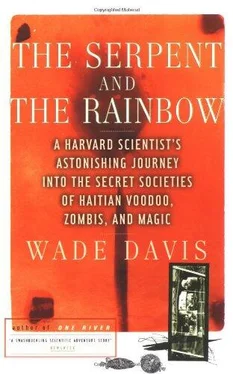Wade Davis - The Serpent and the Rainbow
Здесь есть возможность читать онлайн «Wade Davis - The Serpent and the Rainbow» весь текст электронной книги совершенно бесплатно (целиком полную версию без сокращений). В некоторых случаях можно слушать аудио, скачать через торрент в формате fb2 и присутствует краткое содержание. Год выпуска: 1985, Издательство: Simon & Schuster, Жанр: Старинная литература, на английском языке. Описание произведения, (предисловие) а так же отзывы посетителей доступны на портале библиотеки ЛибКат.
- Название:The Serpent and the Rainbow
- Автор:
- Издательство:Simon & Schuster
- Жанр:
- Год:1985
- ISBN:нет данных
- Рейтинг книги:5 / 5. Голосов: 1
-
Избранное:Добавить в избранное
- Отзывы:
-
Ваша оценка:
- 100
- 1
- 2
- 3
- 4
- 5
The Serpent and the Rainbow: краткое содержание, описание и аннотация
Предлагаем к чтению аннотацию, описание, краткое содержание или предисловие (зависит от того, что написал сам автор книги «The Serpent and the Rainbow»). Если вы не нашли необходимую информацию о книге — напишите в комментариях, мы постараемся отыскать её.
The Serpent and the Rainbow — читать онлайн бесплатно полную книгу (весь текст) целиком
Ниже представлен текст книги, разбитый по страницам. Система сохранения места последней прочитанной страницы, позволяет с удобством читать онлайн бесплатно книгу «The Serpent and the Rainbow», без необходимости каждый раз заново искать на чём Вы остановились. Поставьте закладку, и сможете в любой момент перейти на страницу, на которой закончили чтение.
Интервал:
Закладка:
Though Marcel and his followers had a reputation for selling the powders, it had been immediately apparent to me that the preparation he had made me was fraudulent. The plants used belonged to botanical families known to have little phytochemical significance. And then there was his attitude. He had prepared the reputed poison in the presence of young children and in the immediate vicinity of the living quarters of the houngan. This was most suspicious. Biodynamic plant preparations, be they poisons or hallucinogens, are inherently subversive—the poisons because they kill surreptitiously and the hallucinogens because they expose the frail, ambivalent position of man, perpetually on the cusp between nature, society, and the spirit world. When the shamans in the Amazon prepare and imbibe their potent hallucinogens, they usually leave the village and take their patients with them. Similarly the curare, or arrow poison preparations, are often made in the forest. Haiti is not the Amazon, but I was certain that Marcel Pierre, whatever his reputation, would not make such a deadly, topically active poison so close to his temple and the homes of his people. That would make no sense. Yet if Marcel knew the correct formula, how were we to persuade him to give it to us?
I did have one advantage. Other investigators had assumed that the formula of the zombi poison had to be an esoteric secret. I wasn’t so sure, and anyway I had come not to believe in secrets. For years in the Amazon I had sought information that though not explicitly termed secret was nevertheless closely guarded by Indian peoples. In my experience, success depended less on the inherent status of the information than on the relationship one managed to establish with a knowledgeable informant. Every society has codes and rules, but individuals within a society bend them with zeal. Secrecy may be a rule, but gossip, after all, is the international language.
The purpose of secrets is to protect a society’s interests from threatening outsiders. If a relationship can be established that renders one no longer a threat, the need for the protective veil vanishes. Sometimes such a relationship can take months to establish. Once I spent two seasons attempting to record some tribal myths from an old Tsimshian Indian in northern Canada. I had completely given up, concluding, as he had implied, that the tradition had been lost. Then one day, simply as a gesture, I shot and butchered a moose for him for his winter meat. Bringing game to an elder is a traditional sign of respect, and with my action I had, quite by chance, come to ask my question in the correct manner. That night I began to record a full cycle of tribal myths.
While trust naturally grows slowly, very often a relationship pivots about a single moment, at which time one can proceed only by instinct and inspiration. Andrew Weil, also an ethnobotanist and writer, told me a story from his time among the Yaqui, a notoriously tough and belligerent tribe of northern Mexico. The Yaqui dances are horrendous ordeals, with the endurance of the participants tested by a week of nonstop line dancing. Andrew is one of the few whites to have been invited to participate. The first time he went he was approached by a tough, extremely proud, and apparently antagonistic Yaqui. They squared off, and the Indian pounded his enormous chest as he bellowed “ Soy Indio ”—“I am an Indio.” Indio in Spanish is pejorative, so the fellow was essentially saying, “I’m a spick and what are you going to do about it?” Andrew, who happens to be Jewish, suddenly smashed his own chest and yelled “Soy Judeo.” Then the Yaqui answered with “I’m a filthy Indio,” and Andrew countered with “I’m a greedy Jew,” and so it went until the two of them had exhausted every conceivable derogatory phrase. Then suddenly they collapsed in laughter, and for the rest of the festival Andrew had this man for his companion and mentor. The point is, the Yaqui had in some sense to display his “Yaqui-ness” to the visiting white, and by returning his own ethnic bravado, exposing its foolishness, Andrew had cleverly deflected a potentially nasty situation and established a true bond.
My challenge, of course, would be to establish a similar bond with Marcel Pierre.
The bar was deserted, but when Max Beauvoir and I entered the hounfour there were three of them, sitting with their backs to the ochre walls of the bagi. Marcel still hid most of his face, offering only the same cold plastic stare. I greeted him. He made a place for me beside him, near a table.
“Well,” he said.
“It didn’t work,” I told him. Beauvoir lit a cigarette and repeated my words in a low voice. I added, “Ten days I waited and nothing happened.”
Marcel showed disbelief.
“Your poison is useless,” I said. Then I looked around him at his two companions and asked why they bothered to hang out with a charlatan. One of them made a move toward me. Beauvoir ordered him to sit.
Marcel flushed, and then for the first time the words poured out of him. He called me a liar in a dozen ways before moving indignantly into the bagi. Beauvoir dismissed the onlookers. Marcel came back with a bag containing the same white aspirin bottle he had shown us the first day. As he crossed in front of me I grabbed the bag from his hand, tore off the top of the bottle, and, with my hands above his line of sight, pretended to pour the brown powder onto my hand. It did not touch my skin, but Marcel was certain that it had. I pretended to examine the poison and then to return it to the bottle. I replaced the top and, as I passed it back to him, cleaned my left hand on the leg of my trousers.
“Sawdust,” I said contemptuously.
Marcel fell back, momentarily silent. Flies like huge particles of dust danced up and down a shaft of light that cut across his face. Looking first at me and then at Beauvoir, he said simply, “He is a dead man.”
I got to my feet slowly. “Tell me, then, when will I die?”
Marcel sensed his advantage. “A day, a week, a month, a year. You shall die from handling that powder.”
I drew a breath and felt the hot air sink into my chest. I could only maintain the ruse. “So what are you trying to tell me? Everyone must die sometime.”
For the first time, Marcel laughed, revealing a row of perfect teeth. Looking toward Beauvoir he said, “This white of yours is a brave man,” and after a pause, “but he is also very stupid.” Only later would I discover that the small white jar contained the real poison.
Moments later the subject of money rekindled Marcel’s fury. It was one thing to question the quality of his preparations, it was quite another to demand the return of money that he had already spent. By now several of his women had slipped back into the hounfour. This time when he flew into the bagi, it was with a small black vial that he returned. He placed it delicately, almost reverently, on the table between us. Rage still marked his face, and rivulets of sweat ran across his hairless brow.
“Blanc,” he yelled, “you and your kind come a thousand miles to get my poison. Now you tell me my powder is not good. Why do you waste my time? Why do you insult us?” He paced and slashed the air with his arms. His women formed a cordon around him. Then he stopped.
“If you do not think I make good poison,” he said, gesturing toward the table, “drink this and I promise you will not walk out of here alive.”
The circle of faces challenged me. Beauvoir could do nothing. Marcel came so close I could feel his breath, smell it like a buzzard’s. The silence was unbearable, yet only I could break it.
“Marcel,” I said finally, assuming a conciliatory tone, “it is not a question of whether or not you can make good poison. I know that you can. That is why I came a thousand miles to get it. All I am telling you is that what you made me is worthless.” I stood up and moved away from the table, rubbing my face with my hands. “You may think that the money I paid you is a lot, but for me it was nothing, for it wasn’t my money. To my backers it was so little money that they will not even notice that it’s gone. But if you send me back to New York with that useless powder, you will lose the potential to make thousands and thousands of dollars from us in the future.”
Читать дальшеИнтервал:
Закладка:
Похожие книги на «The Serpent and the Rainbow»
Представляем Вашему вниманию похожие книги на «The Serpent and the Rainbow» списком для выбора. Мы отобрали схожую по названию и смыслу литературу в надежде предоставить читателям больше вариантов отыскать новые, интересные, ещё непрочитанные произведения.
Обсуждение, отзывы о книге «The Serpent and the Rainbow» и просто собственные мнения читателей. Оставьте ваши комментарии, напишите, что Вы думаете о произведении, его смысле или главных героях. Укажите что конкретно понравилось, а что нет, и почему Вы так считаете.












